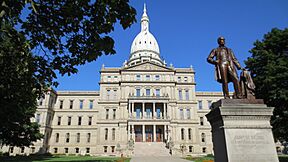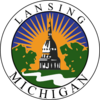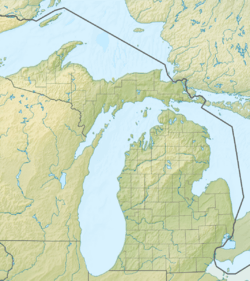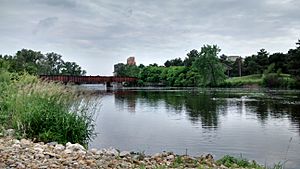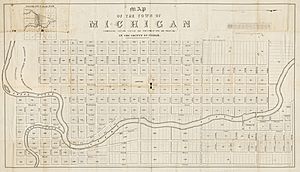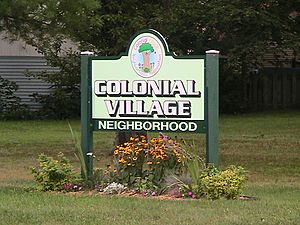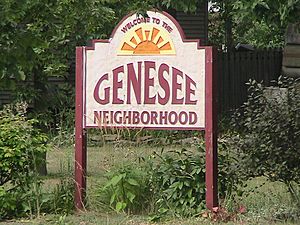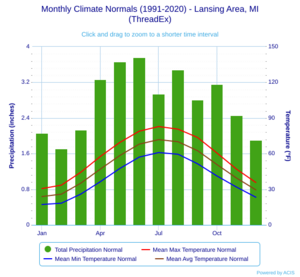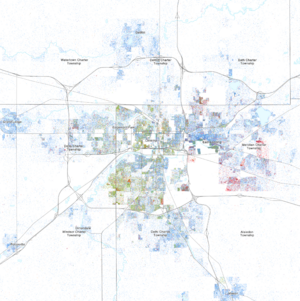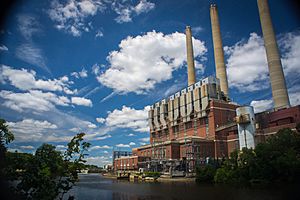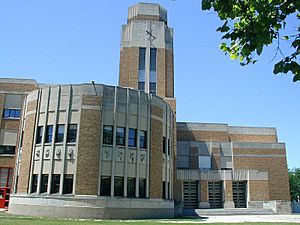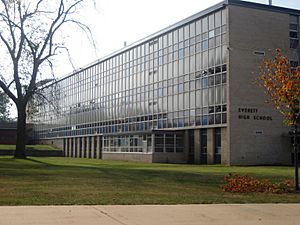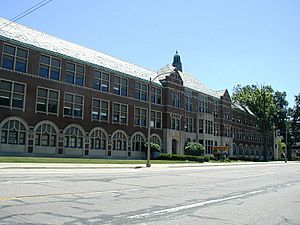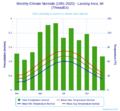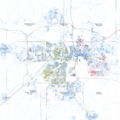Lansing, Michigan facts for kids
Quick facts for kids
Lansing
|
|||||
|---|---|---|---|---|---|
|
|
|||||
|
|||||
| Nickname(s):
Capital City, L-Town, "The Heart of Michigan"
|
|||||
| Country | United States | ||||
| State | Michigan | ||||
| Counties | Clinton, Eaton, and Ingham | ||||
| Settled | 1835 | ||||
| Incorporated | 1859 | ||||
| Named for | Lansing, New York | ||||
| Government | |||||
| • Type | Strong mayor–council | ||||
| Area | |||||
| • City | 39.78 sq mi (103.03 km2) | ||||
| • Land | 39.14 sq mi (101.38 km2) | ||||
| • Water | 0.64 sq mi (1.65 km2) | ||||
| • Urban | 155.8 sq mi (354.4 km2) | ||||
| • Metro | 1,714.6 sq mi (4,440.8 km2) | ||||
| Elevation | 853 ft (260 m) | ||||
| Population
(2020)
|
|||||
| • City | 112,644 | ||||
| • Density | 2,877.68/sq mi (1,111.09/km2) | ||||
| • Urban | 318,300 (US: 128th) | ||||
| • Urban density | 2,042.6/sq mi (788.7/km2) | ||||
| • Metro | 541,297 (US: 106th) | ||||
| Demonym(s) | Lansingite, Lanstronaut (informal) | ||||
| Time zone | UTC−5 (EST) | ||||
| • Summer (DST) | UTC−4 (EDT) | ||||
| ZIP Codes |
48901, 48906, 48908–48913, 48915–48919, 48921, 48922, 48924, 48929, 48930, 48933, 48937, 48950, 48951, 48956
|
||||
| Area code(s) | 517 | ||||
| FIPS code | 26-46000 | ||||
| GNIS feature ID | 1625035 | ||||
Lansing is the capital city of Michigan, a state in the United States. It is mostly located in Ingham County, but parts also reach into Eaton County and Clinton County. In 2020, about 112,644 people lived in Lansing, making it the sixth largest city in Michigan. The larger Lansing area, including nearby towns, had about 541,297 people.
Lansing became Michigan's capital in 1847, ten years after Michigan became a state. The area, often called "Mid-Michigan," is important for education, culture, government, business, and industry. Nearby East Lansing is home to Michigan State University, a large public university. The Lansing area also has several medical and law schools. It is where you'll find the Michigan State Capitol building, the state's highest courts, and the main offices for several national insurance companies.
Lansing is special because it's one of the few state capitals in the U.S. that is not also the main city (county seat) of its county. The county seat for Ingham County is Mason, but Ingham County still has some offices in Lansing.
Contents
- History of Lansing: From Forests to Capital City
- Geography of Lansing
- People and Diversity in Lansing
- Lansing's Economy and Jobs
- Education in Lansing
- Cultural Events and Fun in Lansing
- Places to Visit in Lansing
- Media in Lansing
- Sports in Lansing
- Getting Around Lansing: Transportation
- Utilities in Lansing
- Famous People from Lansing
- Lansing's International Connections
- Images for kids
- See also
History of Lansing: From Forests to Capital City
Early Exploration and Land Surveys
The first European person known to travel through the Lansing area was Hugh Heward, a British fur trader. He canoed along the Grand River in 1790. The land that would become Lansing was surveyed in 1827. At that time, it was a thick forest with no roads for many years.
The Story of Biddle City: A Founding Myth
There's a popular story about Lansing's start that isn't quite true. The story says that in 1835, two brothers from New York tried to sell land for a new city called "Biddle City." They claimed it had 65 blocks, a church, and public squares. But the land was actually in a floodplain and often underwater.
People bought plots in this "city" that didn't exist. When they arrived, they realized it was a trick. Many of them, without money to move on, decided to stay and settled nearby. This story became famous because a former Lansing mayor shared it in 1904. While parts of it are true, the idea that Lansing started from a "land scam" is incorrect.
How Lansing Really Began as a Town
The brothers in the story, William and Jerry Ford, were actually respected businessmen from Jackson, Michigan. In 1836, they bought land and planned a community called Biddle City. It was located south of where the Grand River and Red Cedar River meet. They sold some land parcels, mostly to people already in Michigan, who knew it wasn't a fully built city yet. However, a financial crisis in 1837 stopped Biddle City from growing.
Lansing wasn't originally called Biddle City. The area was named Lansing Township in 1842 by Joseph E. North Sr., who came from Lansing, New York. The small settlement remained quiet until 1847.
Why Lansing Became the Capital City
In 1847, Michigan's state rules said the capital had to move from Detroit. People wanted it to be more central and safer, away from British-controlled Canada. Detroit had been captured in the War of 1812, and leaders wanted the government center further from potential conflict. There was also concern that Detroit had too much power in state politics.
Many cities, like Ann Arbor and Jackson, wanted to be the new capital. But they couldn't agree. Finally, the Michigan State House of Representatives secretly chose Lansing Township. Many people laughed when they heard this, as Lansing was just a small settlement. But two months later, the governor signed the law making Lansing Township the state capital.
Growth of the Capital City
After Lansing Township became the capital, it quickly grew. New settlements formed along the Grand River:
- Lower Village/Town: This was the oldest area, now called Old Town. It grew after a covered bridge was built over the Grand River in 1847.
- Upper Village/Town: Now known as REO Town, this area grew when the Main Street Bridge was built in 1847. It had a large hotel called the Benton House.
- Middle Village/Town: This area, now Downtown Lansing, was the last to develop in 1848. It grew with a new bridge and a temporary capitol building. This area soon became the largest of the three.
These settlements were first called the "Village of Michigan." In 1842, the area was officially named Lansing Township. On February 15, 1859, the settlement, with almost 3,000 people, became the City of Lansing.
Lansing continued to grow as railroads were built and the current Michigan State Capitol building was finished in 1878. The city became an industrial center, especially after the Olds Motor Vehicle Company was founded in 1897. Ransom E. Olds later started the REO Motor Car Company. Over the years, Lansing became a major place for making cars and car parts. Today, Lansing's economy includes government, healthcare, manufacturing, insurance, banking, and education.
Important Moments in Lansing's History
Lansing's Role in the Anti-Slavery Movement
In the late 1840s and early 1850s, many Lansing citizens were against slavery. The city became a stop on the Underground Railroad. This was a secret network that helped enslaved people escape to freedom. From Lansing, the route led to other cities in Michigan and then to Canada.
Major Fires in Lansing
Lansing has experienced some significant fires. The Kerns Hotel fire on December 11, 1934, was a very serious event. Many people lost their lives in this fire. Another fire occurred on February 8, 1951, at the Elliott-Larsen Building. This fire caused a large number of state historical records to be destroyed.
The Elephant Incident
On September 26, 1963, a 12-year-old elephant named Rajje escaped from a circus performance. She ran through the streets of Lansing, causing some damage and attracting a large crowd. The incident ended with the elephant being shot by police. This unusual event was reported widely, even in Life magazine.
Geography of Lansing
Lansing is located in the south-central part of Michigan's Lower Peninsula. It's often called the center of the "Mid-Michigan" region. The city is where the Grand River meets the Red Cedar River.
The city covers about 36.05 square miles of land. Lansing's elevation changes, from about 890 feet above sea level in the south to around 805.5 feet along the Grand River.
The Grand River is Michigan's largest river and flows through downtown Lansing. The Red Cedar River flows through the Michigan State University campus before joining the Grand River in Lansing. Sycamore Creek also flows through the city.
There are two lakes nearby, Park Lake and Lake Lansing, both northeast of the city. Lake Lansing is a popular spot for swimming, boating, and fishing in the summer.
Lansing has many parks and open spaces. About 10% of the city's area is publicly managed open space, including parks, golf courses, and cemeteries.
Lansing's Neighborhoods and Districts
Lansing's downtown area is mainly home to state government buildings, like the Michigan State Capitol. However, it also has new restaurants, shops, and homes. North of downtown is historic Old Town Lansing, with many old and interesting buildings. South of downtown is "REO Town," where the first automobiles were made in the United States by Ransom Eli Olds.
Lansing is generally divided into four main parts:
- The Eastside: This area is east of the Grand River and north of the Red Cedar River. It's known for being very diverse, with many people from other countries living there. Its main shopping areas are along Michigan Avenue and Kalamazoo Street.
- The Westside: This area wraps around the Grand River. It includes downtown Lansing and mostly residential neighborhoods.
- The Northwestside: This is the smallest part of the city, located north of the Grand River. It has homes, some green areas, and light industrial zones. The Capital Region International Airport is a key landmark here.
- The Southside: This is the largest and most populated part of the city, south of the Grand and Red Cedar rivers. It's mainly residential, with many shopping areas along streets like Cedar Street and Martin Luther King Jr. Boulevard.
Some areas next to Lansing, like Edgemont Park and Waverly, use Lansing mailing addresses even though they are not officially part of the city.
Lansing's Districts
- Cherry Hill
- Churchill Downs
- Colonial Village
- Eastside
- Edgewood
- Genesee
- Gier Park
- Hosmer
- Lansing-Eaton
- Moores Park
- Museum District
- Old Everett
- Old Town
- REO Town
- Stadium District
- Walnut
- Washington Square
- Westside
Lansing's Climate and Weather
Lansing has a climate with cold, snowy winters and warm, humid summers. This is typical for the Midwest and is affected by the Great Lakes. The average temperature in July is about 71.5°F (21.9°C), and in January, it's about 23.4°F (-4.8°C).
On average, temperatures reach 90°F (32°C) about 8.8 days a year. They drop to 0°F (-18°C) or below about 10.5 nights a year. Snow usually falls from November to April, with an average of 51.1 inches (130 cm) per season. Lansing gets less snow than some areas further west because it's less affected by "lake-effect snow."
People and Diversity in Lansing
| Historical population | |||
|---|---|---|---|
| Census | Pop. | %± | |
| 1850 | 1,229 | — | |
| 1860 | 3,074 | 150.1% | |
| 1870 | 5,241 | 70.5% | |
| 1880 | 8,319 | 58.7% | |
| 1890 | 13,102 | 57.5% | |
| 1900 | 16,485 | 25.8% | |
| 1910 | 31,229 | 89.4% | |
| 1920 | 57,327 | 83.6% | |
| 1930 | 78,397 | 36.8% | |
| 1940 | 78,753 | 0.5% | |
| 1950 | 92,129 | 17.0% | |
| 1960 | 107,807 | 17.0% | |
| 1970 | 131,403 | 21.9% | |
| 1980 | 130,414 | −0.8% | |
| 1990 | 127,321 | −2.4% | |
| 2000 | 119,128 | −6.4% | |
| 2010 | 114,297 | −4.1% | |
| 2020 | 112,644 | −1.4% | |
| 2023 (est.) | 112,115 | −1.9% | |
| U.S. Decennial Census U.S. Census Bureau Population Estimates Program |
|||
Lansing is a diverse city. According to the 2020 census, about 51.4% of residents were White (not Hispanic), 22.5% were African American, and 13.7% were Hispanic or Latino. People from other races and those of mixed race also make up a significant part of the population.
Immigration and Refugee Support
The Lansing area is known for welcoming refugees. Many organizations help refugees settle in the area, providing education and social support. For example, Michigan State University students often volunteer for these programs.
Lansing is also home to many international students attending Lansing Community College and Michigan State University. The Lansing School District even offers language programs in Spanish and Chinese for its students.
Lansing's Economy and Jobs
| Top City Employers Source: Lansing Economic Area Partnership |
||
| Rank | Company/Organization | # |
|---|---|---|
| 1 | State of Michigan | 14,390 |
| 2 | Michigan State University | 10,253 |
| 3 | University of Michigan Health - Sparrow | 7,600 |
| 4 | General Motors | 4,549 |
| 5 | Lansing Community College | 3,144 |
| 6 | McLaren Greater Lansing | 3,000 |
| 7 | Auto-Owners Insurance | 2,578 |
| 8 | Peckham | 2,510 |
| 9 | Jackson National Life | 2,500 |
| 10 | Dart Container | 2,000 |
| 11 | Meijer | 1,500 |
| 12 | Dean Transportation | 800 |
| 13 | Delta Dental | 800 |
| 14 | MSU Federal Credit Union | 800 |
| 15 | Michigan Farm Bureau | 750 |
The Lansing area has a strong economy with several major industries. These include government, education, insurance, healthcare, and car manufacturing. Since Lansing is the state capital, many state government workers live and work here.
Large employers in the region include Michigan State University, Thomas M. Cooley Law School, and Lansing Community College. General Motors also has offices and factories in and around Lansing. The area is home to the main offices of four big national insurance companies: Auto-Owners Insurance Company, Jackson National Life, the Accident Fund, and Michigan Millers Insurance Company.
The local convenience store chain, Quality Dairy, is also a big part of Lansing's market. It started in 1936 and now has 26 stores in the Mid-Michigan area.
Lansing is also focusing on growing its high-technology sector. The city has many technology companies in areas like information technology and biotechnology.
Healthcare Services in Lansing
Lansing has excellent healthcare facilities. University of Michigan Health - Sparrow Lansing is a large hospital with 740 beds. It works with Michigan State University's medical schools. This hospital has a Level I Trauma Center and its own helicopter service for emergencies.
McLaren–Greater Lansing Hospital also provides healthcare services. It has a special partnership with the University of Michigan and Michigan State University for cancer treatment.
Downtown Lansing's Growth and Renewal
Lansing's downtown area has seen many new projects. Old buildings are being turned into modern apartments and shops. For example, The Arbaugh, a former department store, became apartments in 2005. The Motor Wheel Lofts, an old industrial site, was also turned into living spaces.
A new area called "The Stadium District" was built near Cooley Law School Stadium, offering shops and homes. The historic Mutual Building and Hollister Building have also been renovated. The Accident Fund Insurance Company moved its headquarters into the renovated Ottawa Street Powerplant, adding a modern section. These projects are helping to bring new life and activity to downtown Lansing.
Shopping in the Lansing Area
The Lansing area has several large shopping centers. These include two major malls: Lansing Mall and Meridian Mall. Other popular retail spots are Eastwood Towne Center and Frandor Shopping Center.
Education in Lansing
Lansing is a great place for education, with several important institutions.
Michigan State University (MSU) is a very large university located in nearby East Lansing. It's known as a "pioneer land grant college" and has one of the biggest campuses in the U.S. MSU offers over 200 different study programs and has 14 schools and colleges, including three medical schools and a law school. It's also famous for its study abroad programs and its top-rated College of Education.
Lansing Community College (LCC) offers more than 500 areas of study to over 18,000 students. Its main campus is in Lansing, and it has many smaller centers. LCC's University Center allows students to take courses that can count towards degrees from other Michigan universities.
Other colleges in the area include Western Michigan University (with a branch campus), Davenport University in Downtown Lansing, Central Michigan University (with a branch campus), and Great Lakes Christian College.
Lansing Public Schools
Most of Lansing is served by the Lansing School District. Other parts of the city are in the East Lansing School District, Holt Public Schools, Mason Public Schools, Okemos Public Schools, and Waverly Community Schools.
The Lansing School District includes:
- Lansing Eastern High School
- Lansing Everett High School
- J. W. Sexton High School
Cultural Events and Fun in Lansing
Parades and Festivals
Lansing hosts many exciting events throughout the year:
- The African American Parade is part of the annual Juneteenth Celebration on Lansing's Westside.
- Each August, the Michigan Pride festival includes an LGBT pride parade from Riverfront Park to the capitol.
- The annual Silver Bells in the City Electric Light Parade happens every November. It's followed by the lighting of Michigan's official Christmas tree and a firework show near the State Capitol.
Music Scene in Lansing
Lansing has a lively music scene:
- The Lansing Symphony Orchestra has been performing for Lansing residents since 1929.
- The Lansing JazzFest and the Old Town BluesFest bring in famous musicians and are some of the biggest music festivals in the state.
- Old Town also hosts the Festival of the Moon and Sun, with food and live music.
- Old Town Oktoberfest is a two-day event with polka music, German food, and German-style beer.
- "Blues on the Square" is a series of blues concerts held in downtown Lansing during the summer.
- The Common Ground Festival is a big music event held every July at Adado Riverfront Park. It features many different types of music and attracts large crowds.
Places to Visit in Lansing
Farmers' Markets
Lansing has several farmers' markets during the summer. You can find fresh produce and local goods at places like the Allen Street Farmer's Market, Westside Farmers' Market, Old Town Farmer's Market, and South Lansing Farmer's Market.
Libraries for Learning and Fun
The Library of Michigan and Historical Center is a state library and research center. It has one of the largest collections for family history research in the U.S. The Capital Area District Library has 13 branches in Ingham County, including the Main Library downtown.
Museums to Explore
Lansing has several unique museums:
- The Impression 5 Science Center is a children's science center located in an old factory building.
- The Michigan Library and Historical Center has a museum about Michigan's history.
- The Michigan Women's Hall of Fame celebrates the achievements of Michigan women.
- The R. E. Olds Transportation Museum teaches about Lansing's role in developing transportation, especially cars.
- The Turner-Dodge House is a museum about Lansing's early settlers, located in a historic mansion built in 1858.
Theatre and Performing Arts
Lansing has a strong performing arts community:
- The Riverwalk Theatre and the Lansing Civic Players offer live theatre performances.
- Peppermint Creek Theatre Company is a well-known theatre group.
- Happendance is Michigan's longest-running professional modern dance company.
- The Greater Lansing Ballet Company performs ballet and other dance styles.
Potter Park Zoo: A Wild Adventure
The historic Potter Park Zoo is located along the Red Cedar River in Lansing. This 102-acre park is home to over 160 different animal species. The zoo offers many programs and events for children and families. It has been growing in popularity and continues to add new exhibits, like a Black Rhino exhibit and a moose exhibit.
Other Fun Destinations in the Area
The Wharton Center for Performing Arts hosts many Broadway shows and other performances. The Kresge Art Museum, the MSU Museum, and the Abrams Planetarium are also great cultural spots on the campus of Michigan State University in East Lansing. A new art museum, designed by a famous architect, opened in East Lansing in 2012.
Media in Lansing
Newspapers and Magazines
- Lansing State Journal
- City Pulse
- The New Citizens Press
- Capital Gains Media
Television Channels
Radio Stations
Lansing has many radio stations playing different types of music and talk shows. Some examples include:
- 88.9 WDBM – (East Lansing, college radio) "The Impact"
- 90.5 WKAR – (East Lansing, public radio)
- 94.9 WMMQ – (East Lansing, classic rock)
- 97.5 WJIM – (CHR) "97-5 Now-FM"
- 100.7 WITL-FM – (country) "Whittle"
- 1240 AM WJIM – (news/talk) "Lansing's Big Talker"
Sports in Lansing
| Club | Sport | League | Venue | Years of Existence |
| Lansing Lugnuts | Baseball | High-A Central | Jackson Field | 1996–present |
| Michigan State Spartans | College athletics | Big Ten Conference | Various Stadiums | |
| Lansing Community College | College athletics | Michigan Community College Athletic Association | ||
| Lansing Roller Derby | Roller derby | Women's Flat Track Derby Association | Lansing Center | |
| Lansing Common FC | Soccer | Midwest Premier League | Eastern Stadium | 2020–present |
Lansing is home to the Lansing Lugnuts, a Minor League Baseball team. They play their games at Jackson Field in downtown Lansing. This stadium can hold over 11,000 fans.
Michigan State University in East Lansing has many sports teams, known as the Spartans. They compete in the Big Ten Conference and have won national titles in sports like men's basketball, football, and ice hockey.
Lansing Community College also has many sports teams, called the Stars. They have won national titles in sports like women's softball and men's basketball.
The Lansing area is also popular for golf, with several courses owned by Michigan State University and the city.
Getting Around Lansing: Transportation
Air Travel
Capital Region International Airport offers flights to major cities like Detroit, Minneapolis, and Chicago. It also has seasonal flights to places like Cancún, Mexico. The airport is also a freight hub, handling a lot of cargo. In 2008, it became a "port of entry" called Port Lansing, meaning it has a permanent customs facility.
Major Roads and Highways
Several important highways run through or near Lansing:
 I-69 connects Lansing to Indianapolis and Port Huron.
I-69 connects Lansing to Indianapolis and Port Huron. I-96 runs from Muskegon to Detroit, passing through Lansing.
I-96 runs from Muskegon to Detroit, passing through Lansing. I-496 loops through downtown Lansing.
I-496 loops through downtown Lansing. US 127 is a north-south highway between Lansing and East Lansing.
US 127 is a north-south highway between Lansing and East Lansing.
Train Services
Amtrak provides passenger train service from a stop in nearby East Lansing. The Blue Water line runs from Chicago to Port Huron. Three freight railroads also serve Lansing.
Public Transportation
The Capital Area Transportation Authority (CATA) provides bus service throughout the Lansing-East Lansing area. CATA is very popular, with millions of rides each year. They also offer special services like Spec-Tran and the "Night Owl." CATA won an award in 2007 for being one of America's best transit systems.
Greyhound Lines offers bus service to other cities from the CATA Transportation Center downtown. There are also several taxi companies, including the Green Cab Company, which uses hybrid cars. The Michigan Flyer provides bus service between Lansing and the Detroit Metro Airport.
Bicycling in Lansing
The Lansing River Trail is a 13-mile paved path for walking and biking. It runs along the Grand River and the Red Cedar River, passing by places like Potter Park Zoo and the Capitol Loop. The trail connects to other paths in the Lansing area and is designed to be easy to use, with many crossings going under bridges.
Utilities in Lansing
Water, power, and steam services in Lansing are provided by the city-owned Lansing Board of Water & Light. In 2008, they built Michigan's largest solar array to help increase the use of renewable energy. Natural gas is provided by Consumers Energy.
Famous People from Lansing
- Joel Bakan, Canadian law professor and filmmaker
- Ray Stannard Baker, journalist and author
- Ricky Berry, NBA player
- Terry Brunk, professional wrestler
- Timothy Busfield, actor and director
- Candi Carpenter, country singer
- Jim Cash, screenwriter of Top Gun
- Carolyn Cassady, writer
- Ian Conyers, former Michigan State Senator
- Alva M. Cummins, lawyer
- Doc Corbin Dart, singer
- DJ Infamous, hip-hop DJ
- Tony Earl, former Governor of Wisconsin
- Ed Emshwiller, visual artist
- Rashad Evans, UFC fighter
- David Fairchild, botanist
- Ed Farhat, professional wrestler
- Jonathan Farwell, actor
- Bryn Forbes, NBA basketball player
- Chris Hansen, Dateline NBC correspondent
- Thom Hartmann, radio talk-show host
- Ahney Her, actress, Gran Torino
- Joel Higgins, actor
- Andy Hilbert, NHL hockey player
- Keiffer Hubbell, figure skater
- Madison Hubbell, figure skater
- Steve Huffman, co-founder of Reddit
- John Hughes, film writer and director
- Carol Hutchins, softball Hall of Famer
- Kevin Jackson, Olympic gold medalist in wrestling
- Magic Johnson, NBA basketball star
- Jacquelyn Kelley, baseball player
- Michael Kimball, novelist
- Lisa Kron, theatre actress and playwright
- Matthew Lillard, actor
- Dean Look, football player
- Malcolm X, human rights activist
- Jef Mallett, comic strip artist
- Suzanne Malveaux, CNN reporter
- Teal Marchande, actress
- Todd Martin, tennis player
- Pop McKale, athlete and coach
- Drew Miller, NHL hockey player
- Kelly Miller, NHL player
- Kip Miller, NHL player
- Ryan Miller, NHL and Olympic hockey player
- Muhsin Muhammad, NFL football player
- Needlz, hip-hop producer
- Ransom E. Olds, automobile manufacturer
- Larry Page, co-founder of Google.com
- DJ Perry, film writer, actor and director
- Wally Pipp, former baseball player
- Alice Pollitt, baseball player
- Corey Potter, NHL hockey player
- Merv Pregulman, NFL player
- Dan Price, CEO of Gravity Payments
- Greg Raymer, poker champion
- Carl Benton Reid, actor
- Burt Reynolds, Oscar-nominated actor
- Vic Saier, MLB player
- Steven Seagal, actor and martial artist
- Frederic L. Smith, co-founder of General Motors
- John Smoltz, MLB pitcher, Hall of Famer
- Lori Nelson Spielman, author
- Debbie Stabenow, U.S. senator
- Gary Starkweather, inventor of the laser printer
- Billy Strings, guitarist and bluegrass musician
- Marcus Taylor, professional basketball player
- George Teague, NFL player
- Denzel Valentine, professional basketball player
- Jay Vincent, professional basketball player
- Sam Vincent, professional basketball player
- Gretchen Whitmer, Governor of Michigan
- Howard Wolpe, Congressman
- Lebbeus Woods, architect
Lansing's International Connections
Sister Cities
Lansing has several sister cities around the world. These partnerships help promote cultural understanding and exchange:
 Akuapim South District, Ghana
Akuapim South District, Ghana Asan, South Korea
Asan, South Korea Guadalajara, Mexico
Guadalajara, Mexico Ōtsu, Japan
Ōtsu, Japan Pianezza, Italy
Pianezza, Italy Saltillo, Mexico
Saltillo, Mexico Sanming, China
Sanming, China
Lansing used to be a sister city with Kubyashi District in Saint Petersburg, Russia. This agreement ended in 2013.
Friendship Cities
Lansing also has "friendship cities":
 Cosenza, Italy
Cosenza, Italy Dar es Salaam, Tanzania
Dar es Salaam, Tanzania Sakaide, Japan
Sakaide, Japan
Images for kids
See also
 In Spanish: Lansing para niños
In Spanish: Lansing para niños



